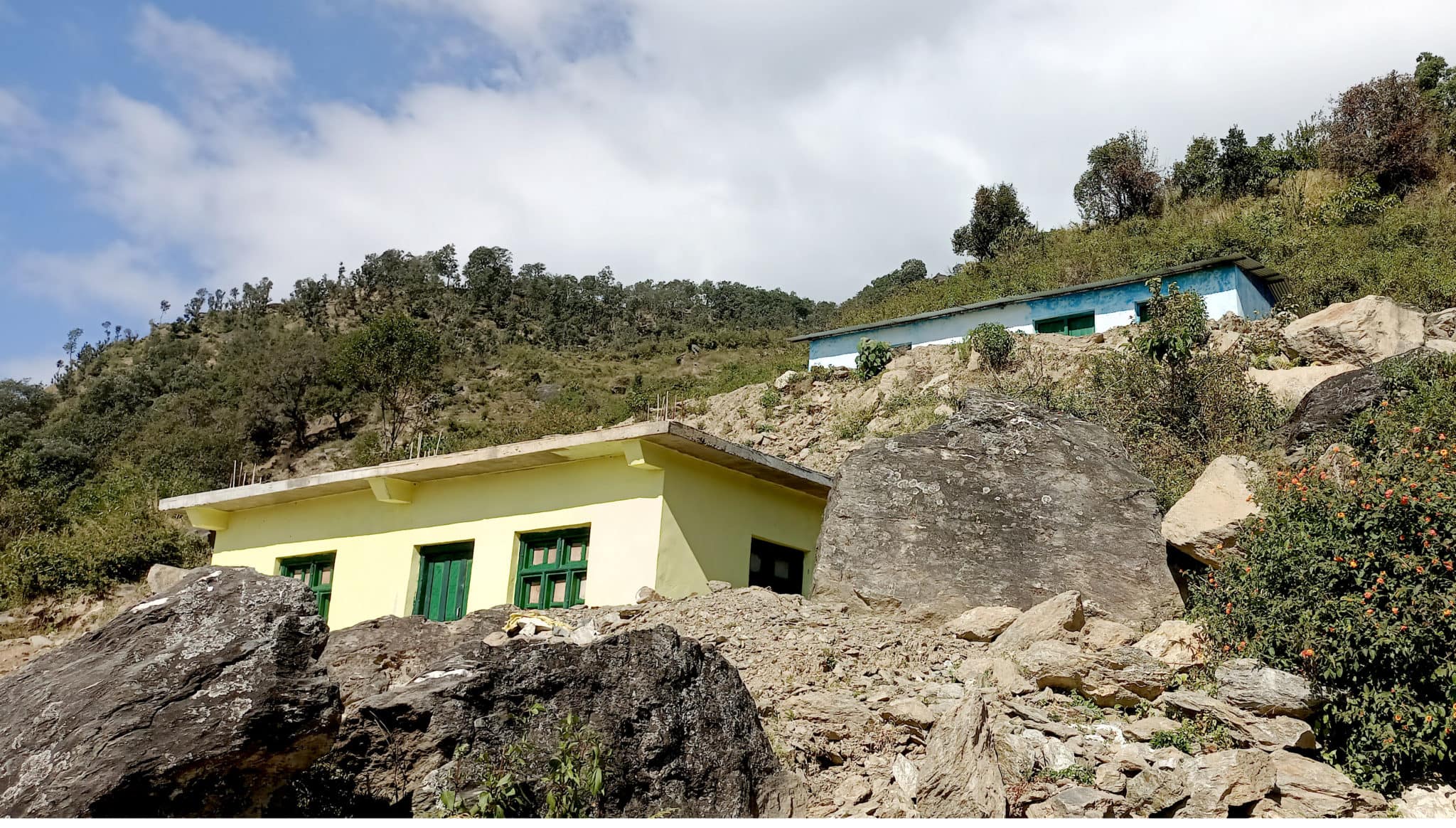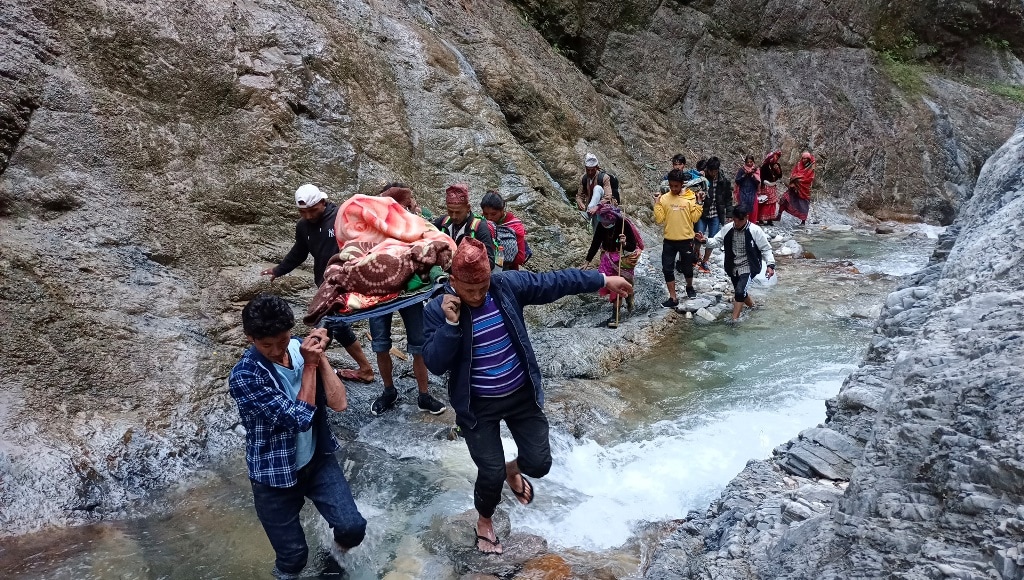The construction of 38 health offices in Sudurpaschim province hasn’t ended Bajura folks’ compulsion to walk hours to reach health institutions. Thirty-six buildings aren’t in operation in Bajura, where the life expectancy of 14 percent of the total population isn’t more than 40 years.
Prakash Singh, |CIJ, Nepal
Three years ago, the Sudurpaschim Province established an Urban Health Center in Budhinanda of Bajura with an investment of Rs 1.5 million. But the construction of this building hasn’t ended the plight of 150 households walking hours to reach the Kolti-based Primary Health Office for getting access to health facilities in case of a health emergency. The newly constructed building has turned useless in absence of health professionals. Locals still face difficulties while carrying sick people on their backs to hospitals along banks of risky streams.
Some women from remote villages of Budhinanda namely Bhulena, Nuri, Taligoth and Kuru give birth to babies on the way to health offices. Last year, Ambakala, 23, of Kuruki, Budhananda died on the way while being taken to the health office. At least three babies born on the way to hospital died in the last six years, informed Sher Bahadur Budha, a local.
Srishti Regmi, mayor of Budhinanda municipality admits even as health infrastructures are created health facilities remain a far cry mainly due to lack of health workers. “We just recruited an ANM. People are suffering as we failed to manage the required human resources,” said Mayor Regmi.

Two health institutions were constructed in Budhiganga rural municipality of Bajura. These health institutions constructed in a distance of 200 meters are not in operation.
The provincial government has constructed two more health institutions in Juwapaani of Budhiganga municipality spanning a distance of 200 meters. Both the health institutions–Dadeokhal Maternity Center constructed with an investment of 2.5 million some two years ago and Juwan Public Health Post constructed with an investment of Rs 1.5 million last year–are not in operation because of the unavailability of health professionals.
At least a team of three persons—an AHW, an ANM and an office assistant—is essential to run any health institution. But these health institutions have turned non-functional as the municipality fails to manage staffers, says Dipak Shah, health coordinator at the municipality.
Yet, another health office was constructed at Dewalsen of Basure village last year. The institution constructed with an investment of Rs 1.5 million is also facing the same fate. Maya Shah, a member of ward no. 9 of Budhiganga municipality, says an inability to run a health institution is tantamount to a crime.
Bharat Bahadur Thapa, chief of ward no. 9, says the municipality is struggling to manage staffers as these institutions were constructed by the provincial government without proper consultation with locals or local demand.
We constructed the building, responsibility of arranging employees and operation lies on local government. Local governments responsible for running basic health services shouldn’t be irresponsible like this.
-Narendra Karki, health chief at the Social Development Ministry.
“Some influential people and politicians first ensure development projects to show up their power in the village and then only approach us to obtain recommendations just for formality,” said village chief Thapa adding, “Since health is a matter of public welfare it’s hard to reject. If we accept, there’s no plan at all to operate such offices.”
Such construction projects, according to Thapa, were completed by forming users’ groups. Between 2019 to 2022, 38 health offices were constructed in Bajura. Of them, 36 aren’t in operation.
In Budhiganga municipality, four maternity-related health institutions—three maternity hospitals and an urban health center—are constructed. “Due to lack of health professionals, not even a single health institution is in operation,” said health coordinator Dipak Shah.
Shah blames the construction of health infrastructures in the villages that were initiated for pocketing commission instead of real necessity.
“These institutions are rendered useless as they were constructed as part of showing up power and getting a hefty commission,” said Shah adding, “The municipality lacks solid plans to operate them.”
Padam Kumar Giri, mayor of Budhinanga, admits that they are in a difficult position to run health institutions constructed without coordinating with local governments. “Such projects were awarded even without proper need assessment and not knowing whether the local governments can manage staff required to run them,” said mayor Giri.
Four health offices — three maternity intuitions and an urban health center – are constructed in Budhiganga municipality alone but due to lack of workforce not even a single health office is in operation. These institutions are not in operation as they were constructed for the purpose of showing up work and getting commission from it. Rural municipality has no plan to operate them.
-Deepak Shah, health coordinator.
Mayor Giri accuses some members of the users’ committee of assisting to award the project at the cost of getting the project cut. He said the locally elected representatives cannot oppose such projects because of possible protests from locals even as some people misused their influence to seek recommendations only after securing state funds.
Daya Krishna Panta, chief of Bajura Health Office, however, claims the buildings were constructed only after the local governments committed to ensuring needy workforces. “Even as the provincial government supported in constructing buildings local governments didn’t walk their talk,” said Panta.
Dipak Bikram Shahi, mayor of Budhiganga municipality, believes the issue was complicated after the health infrastructures were constructed beyond local demand and necessity.
“Province approved projects and we are in peril in managing staffs,” said mayor shahi informing that the municipality was unable to hire employees due to lack of funds. He said the local governments are not in a position to take ownership of projects, arguing those close to the inner circle of the province’s social development ministry approve plans and later claim commission by forming users’ groups in their involvement.
Bharat Rokaya, secretary of governing Nepali Congress says problems emerged after some projects were approved haphazardly by the provincial government and there’s no coordination between the province and local governments. “Elected people’s representatives at local and provincial governments belong to different parties. One from the province wants to take credit by constructing health institutions but representatives at the local level want to discredit such work,” Rokaya said.
Worrying reproductive health condition
Owing to conflict between provincial and local governments, the reproductive system in Bajura is getting worse. The situation is worrying.
Raji BK of Himali Rural Municipality-7, Badhuki, gave birth to her second child at a cowshed. Raji, who spent a month at the shed, was shifted thereafter she complained of labor pain.

A woman from Budhinanda-3, Bajura, being taken to Kolti after she complained of labor pain.
Dhanu Pandit, 26, another woman from Bandhu had also spent a month at the cowshed together with her baby. Those unable to reach health institutions give birth at the cowsheds and stay there. Also, some lucky women successful to reach hospitals for birthing have to stay at cowsheds upon their return to home.
Some new mothers and infants suffocate to death while staying at cold cowsheds. ANM Chahana Bhat said women face harsher discrimination than that of those practicing menstruation taboo after giving birth to children. “Bad tradition of not allowing new mothers to enter into home and touch other people is still in practice,” said Bhat adding, “Yet, here in our village there is no health institution. No health worker.”
Deprived of timely treatment, at least eight new mothers died in the last three years, according to the Bajura Health Office. Locals say the actual death of new mothers could be higher than official death records.
Of the total eight deceased six died at hospital offices, one at home whereas another woman had died on her way to Dhangadhi.
Tek Bahadur Khadka, the coordinator of Badimalika municipality, says the death of eight new mothers due to lack of treatment shows the people’s poor access to health facilities. “No health institution for regular pregnancy tests and safe delivery,” Khadka, “Neither rest nor nutritious foods.”
Not a single woman from our village has given birth to their babies at the hospital.
-Lalmati Bohora, Kiudi rural municipality.
Even as regular pregnancy tests and safe abortion are mandatory most women in Bajura have no access to health facilities. Only 46.50 percent of the total new mothers had given birth at the health institutions, according to details of the Bajura health office.
“Buildings of health offices are standing there but no doctors,” said Jaula Rokaya, a local of Budhinanda, “We look at those buildings and chew herbs.”
Since it takes time to reach the hospital most pregnant women collapse on their way. They rush to the hospital after labor pain begins. According to Gobinda Bahadur Malla, chairperson of Himali Rural Municipality, it takes a day to reach Kotgaon Health Post from his village. Arguing that no health offices are available in the village Nani Bohara says locals have no other alternatives rather than using herbs.
Prem Kala Kiudi, the deputy health coordinator of Himalai Rural Municipality, says one can’t reach the Health Post from Kiudi and Bichhya villages even walking throughout the day. “Not a single baby from our village was lucky to get birth at the hospital,” said Lalmati Bohara of Kiudi.
Chandra Kala Budha, deputy head of the rural municipality, said her office is considering constructing the health post.
Reports of Human Development Index-2015 and 2011’s national census show 64.1 percent of the population in the district is below the poverty line. Another survey conducted by the Poor Households Identification Board in 2015 shows 71.1 percent of people are poor in the district.
Nepal’s average life expectancy is 69.2 years but it is 59.5 years in Bajura. Thirty-six health offices in Bajura have turned useless in Bajura where 14 percent of the total population live for less than 40 years.
Ineffective insurance program
Beema Board had started an insurance program in Kolti of Bajir from 2016 as provisioned in Health Insurance Act-2074 and National Health Policy. Martadi Hospital was designated as a nodal health insurance program for five local governments and Kolti Primary Health Center for four local governments of east-north areas of Bajura.
Under insurance policy patients get all OPD, emergency and preventive, operation and listed medicines after being categorized as insurance beneficiaries.

Dhanu Pandit, 26, of Himali rural municipality, spent a month at this cowshed after she gave birth to a baby.
Locals including Ganga Ram Luhar of Budhinanda-1, Bajura became part of the health insurance program considering it will help them. But Luhar hasn’t been able to receive any benefits from the health insurance program in recent two years.
Frustrated by the ineffective insurance program, Luhar hasn’t renewed the insurance installment. Luhar is categorized in the list of ultra-poor so she doesn’t need to pay regular insurance installments.
Luhar, a kidney patient, has to buy a painkiller. For him it takes a day to reach Martadi, the district headquarters. Still, he doesn’t receive the stated health facility from the health office whenever she reaches there.
Before starting the insurance program, it was told that a family with five members will get treatment up to Rs 100,000. But locals are bearing all health expenses on their own, according to Manbir Sarki, a leader of former Haliya, the bonded laborer.
Locals from Himalai, Swamikartik, Khapar, and Jagganath rural municipalities have been deprived of health insurance facilities as the insurance program has not yet started in Kolti. Janak Saud, chief of the health insurance program in the far western region, said health authorities are organizing training for health professionals before starting the insurance program. Saud blamed local governments for the delay.
Health official Jasiram Sahai said the health insurance program was delayed due to lack of needy pharmacy and internet services. Srishti Regmi, deputy chief of Budhinanda, said that the municipality has already decided to fix pharmacy and internet facilities. But she didn’t elaborate on what delayed starting insurance programs.



